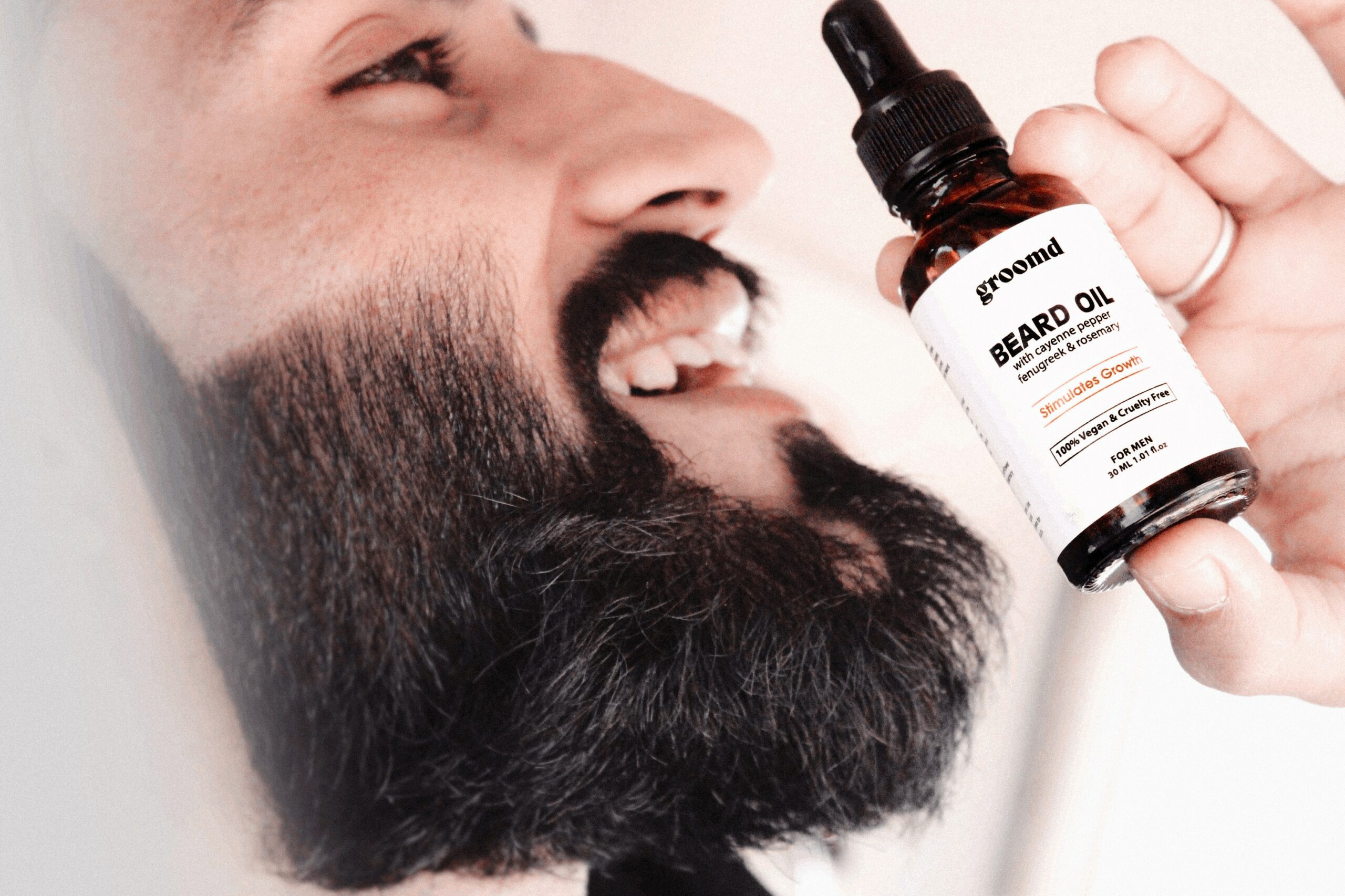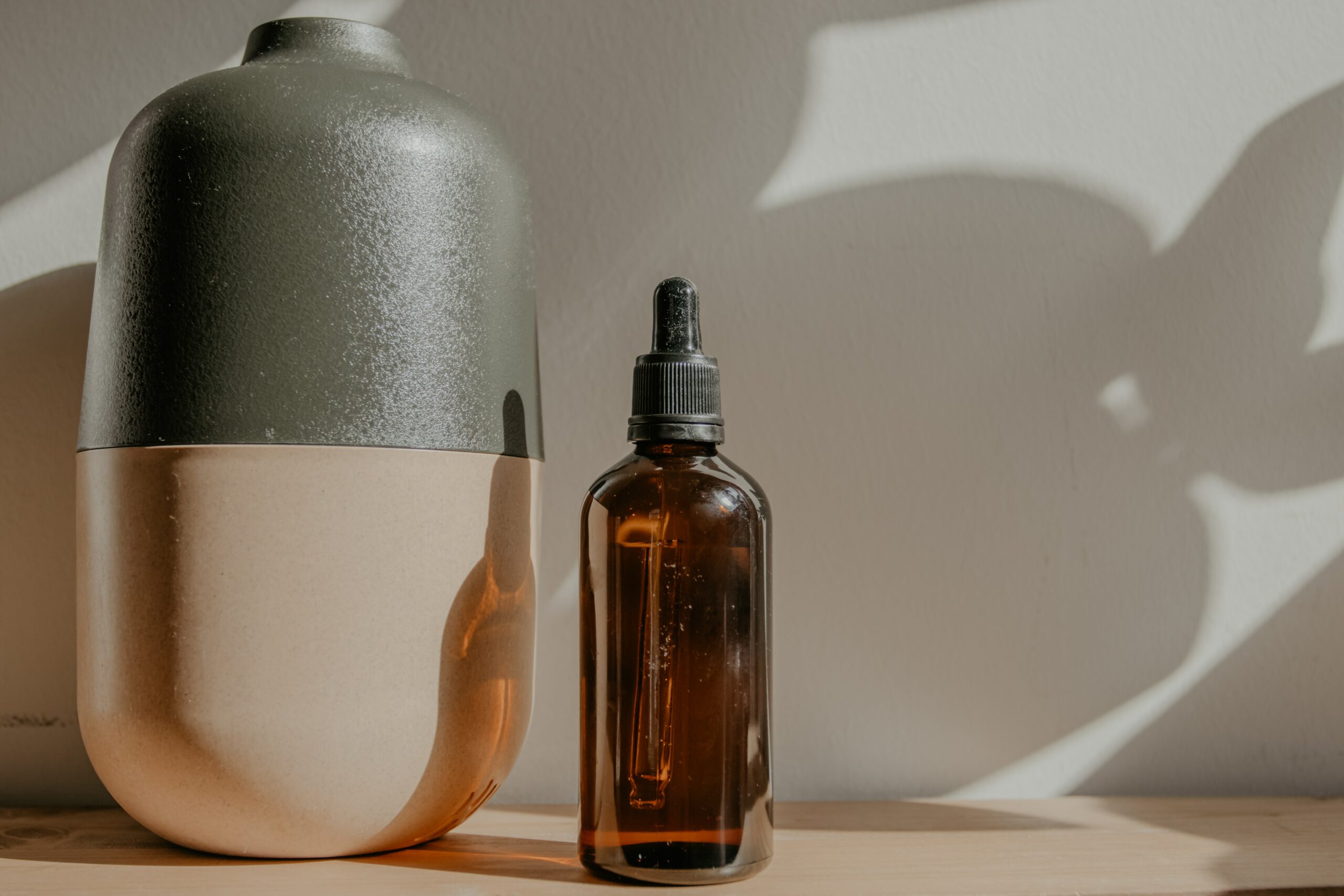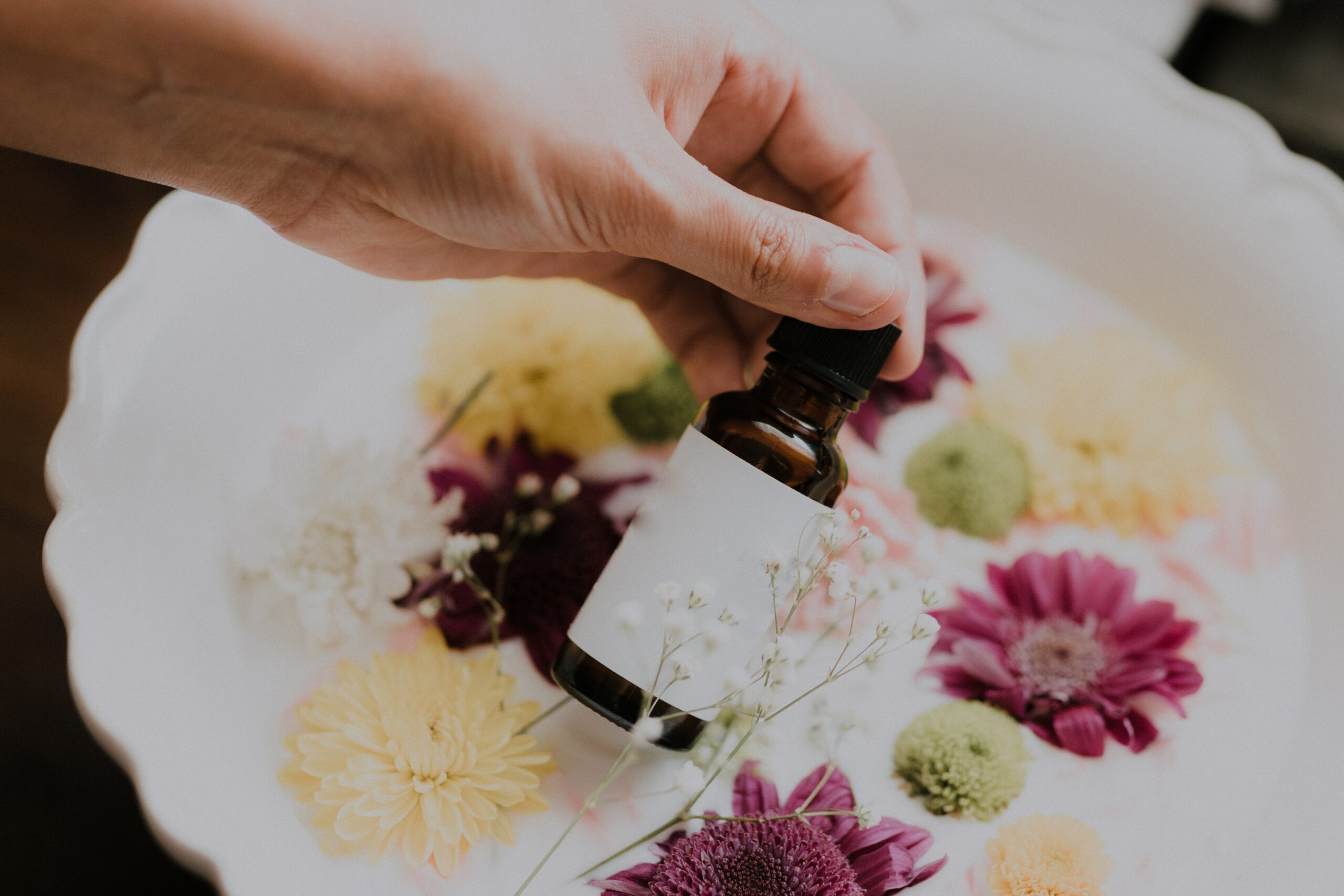A well-groomed beard is the key to a handsome look. If you want to take your facial hair game to the next level, then you need to learn how to make your beard oil.
Not only is it cheaper than buying commercial products, but you can tailor the scent and strength of the oil to suit your preferences.
In this blog post, we’ll show you how to make a simple but effective beard oil using just a few ingredients. Follow our step-by-step instructions and start enjoying softer, healthier facial hair in no time!
What ingredients are in beard oil?
Beard oil is a specialized product designed to moisturize, condition, and style facial hair. It usually consists of a mix of oils – base, conditioning, and essential – that each brings their unique benefit.
Base oils like jojoba, grapeseed, and argan are generally used to provide a lightweight oil that won’t weigh down the beard.
Conditioning oils such as avocado and castor can add lubrication to soften hair, while nourishing substances like Vitamin E may be added to help with the repair.
Essential or Fragrant Oils offer scent to the mixture and can be tailored based on individual preference. With so many beneficial elements working in harmony, it’s no wonder why beard oil has become an essential part of any Vandyved groomed gentleman’s daily routine!
What makes a good beard oil?
A good beard oil should not just be an afterthought in a man’s grooming routine. It should have top-quality ingredients that promote a healthy, soft beard and keep away any irritation and itchiness.
A mixture of natural oils like jojoba, argan, or grapeseed could provide the moisture needed for keeping facial hair looking great and feeling soft.
Vitamins such as Vitamin E or B5 can help the overall health of the skin and follicles.
Essential oils provide additional nourishment to the skin beneath the beard and the beard itself. Still, one must be careful in selecting which oils they include because they can often be too abrasive when combined with other ingredients in high concentrations.
Ultimately, a good beard oil offers all these elements in harmony to create a product that will keep your manly scruff looking handsome and unbeatable!
| Step | Description |
|---|---|
| 1 | Gather ingredients, including carrier oils (such as jojoba, sweet almond, or argan oil), essential oils (such as cedarwood, lavender, or peppermint), and vitamin E oil. |
| 2 | Mix 1/4 cup of the carrier oil with 3-4 drops of the essential oil(s) of your choice in a small glass bottle or jar. |
| 3 | Add a few drops of vitamin E oil to the mixture for preservation and to nourish the skin under the beard. |
| 4 | Close the bottle or jar and shake well to combine all ingredients. |
| 5 | Store the beard oil in a cool, dry place away from direct sunlight, and use it to moisturize and condition your beard daily. |
Is it good to oil your beard every day?
Oiling one’s beard every day has both pros and cons. On one hand, oiling your beard is beneficial in helping to maintain the natural moisture and shine of the beard hair, and for nourishing the skin beneath, which in turn will help to reduce irritation when shaving.
However, there are some downsides to consider – excessive oiling could overweigh a beard, making it harder to style it as you wish. Additionally, a build-up of oil on the face can cause pores to become clogged or attract dust and dirt.
Therefore when considering whether or not to oil one’s beard every day, it’s best to find an appropriate balance that works for you specifically.
Do you apply beard oil wet or dry?
When it comes to applying beard oil, there are certain advantages to doing so either wet or dry.
Wetting the beard before the application can make it easier to spread the product and helps make sure that you don’t miss any areas.
Doing it on a dry beard, however, can allow the oils to soak deeper into individual hairs and make your beard softer with each brushing.
Ultimately, it is up to personal preference which method you choose but also consider what kind of effect you’re looking for when deciding whether or not to use wet or dry application.
What are the side effects of beard oil?
Most people think of beard oil as a purely beneficial product, however, there are some unwanted side effects to consider before reaching for the bottle.
The most common side effect is the overproduction of oil in the skin, which could lead to acne for those with an already oily complexion. Additionally, if the beard oil contains fragrances such as essential oils or other scents, it can cause an allergic reaction including redness and itching.
Finally, some products tend to darken facial hair over time due to the presence of conditioning ingredients such as Vitamin E, so be aware of that if your hair is naturally light. Ultimately, research your product thoroughly to know how it could affect you.
What Are the Benefits of Making Your Own Beard Oil at Home?
The benefits of making your own beard oil at home are numerous. First, it allows you to create a product that is specifically tailored to your individual needs.
You decide what types of oils and fragrances you want in the mix, as well as how much of each ingredient you want.
This means that you can tailor your beard oil to meet the specific needs of your unique beard, such as its thickness and texture.
Furthermore, making your own beard oil gives you complete control over the quality and safety of the product, allowing you to make sure it is free from chemical additives and irritants.
In addition to giving you control over the ingredients used in your blend, making your own beard oil also provides cost savings compared to pre-made products. You won’t have to pay for expensive ingredients or packaging materials if you make them yourself.
Furthermore, if done correctly, homemade beard oil can last for months before needing a refill – so you don’t need to constantly purchase new products every few weeks or months like with pre-made oils.
Finally, by taking on this project yourself, it can become a fun way of customizing and experimenting with different scents and combinations until you find exactly what works best for your facial hair and skin type.

How to Choose the Right Oils for Your DIY Beard Oil Recipe?
When it comes to creating the perfect DIY beard oil recipe, choosing the right oils is essential.
The first step should be to determine your skin and beard type, as different oils have different properties that are better suited for certain types of skin and facial hair.
For instance, those with dry skin may benefit from an oil blend that contains jojoba, while those with oily skin should opt for a blend that includes grapeseed oil.
Once you’ve chosen the best base oils for your recipe based on your skin type, it’s time to think about adding essential oils for fragrance.
Start by experimenting with small quantities of various oils until you find the combination that works best for you – it might take some trial and error before hitting on the perfect mix!
Keep in mind that essential oils add both scent and medicinal benefits to your beard oil recipe – so carefully consider each one before adding it to the mix.
How to Measure and Mix the Oils for Optimal Results?
Measuring and mixing the oils for your DIY beard oil recipe is an essential step that should not be overlooked. When measuring, it’s important to use a scale since volume measurements can vary significantly from one container to another.
Start by adding the base oil in the largest proportion of your blend and then add essential oils in small increments, making sure to write down the amounts you are using.
Once all of your ingredients are measured out, it’s time to start mixing them together. For this step, you will need a bowl or jar deep enough to hold all the oils as well as a whisk or spoon for stirring.
Begin by slowly pouring each oil into the container while stirring continuously with the whisk or spoon until everything is blended together evenly. Afterward, pour your finished blend into clean bottles before sealing them tightly and storing them away from direct sunlight.

How long does homemade beard oil last?
Homemade beard oil can last for up to six months when stored properly, although the exact length of time depends on the specific ingredients used. To maximize the shelf life, store your blend in a cool, dry area away from direct sunlight and heat.
Additionally, it is best to use bottles or containers that are dark-colored and made of glass as these will help protect the oils from light and air exposure. It is also important to keep all containers tightly sealed in order to prevent any contamination or evaporation of the oils.
When using homemade beard oil, it is important to pay attention to any signs of degradation such as changes in color or smell.
Additionally, check for any separation between the base and essential oils as this indicates that some of the components have started to break down and should be discarded immediately.
What oils are safe for beards?
When it comes to choosing safe oils for your beard, there are a few basic guidelines to follow.
The best options are organic, cold-pressed oils with no added chemicals or preservatives. Oils such as jojoba, argan, and avocado are all excellent choices that can help hydrate and nourish the hair follicles while also providing antioxidants and vitamins.
Grapeseed oil is another popular choice due to its ability to condition the hair without leaving an oily residue.
Coconut oil is a good option as well, although it should be used in small amounts since it can be quite heavy on the skin.
It’s also important to remember that some oils may not be suitable for everyone – for example, those with very sensitive skin may wish to avoid peppermint or menthol-based products as these can cause irritation.
Furthermore, many people prefer to avoid synthetic fragrances or anything else artificial in their blend in order to reduce the risk of potential reactions or allergies.
What oils help beard growth?
When it comes to promoting beard growth, certain oils can provide a variety of benefits.
Oils such as jojoba and argan oil have been found to help soften and moisturize the skin, which in turn can help reduce irritation and inflammation that can inhibit hair growth. Additionally, these oils are rich in vitamins and antioxidants that nourish the hair follicles and promote healthy hair growth.
Coconut oil is another great option as it contains lauric acid, which is known for its antibacterial properties that may help keep bacteria away from the follicles.
Essential oils such as tea tree, lavender, and rosemary are often used to stimulate hair growth due to their anti-inflammatory properties.
They work by increasing the circulation of blood in the scalp, which helps to nourish the hair follicles and promote thicker, healthier beards over time.
Additionally, some essential oils contain compounds that may encourage cell regeneration within the follicles – this means they may also be useful for treating areas with patchy or thinning facial hair as well.

Wrapping Up: How To Make Beard Oil at Home?
With the right ingredients and a bit of elbow grease, learning how to make your beard oil at home is a satisfying DIY project that can take care of your skin and save you money.
By customizing different carrier oils, essential oils, and scent additives, you can develop the perfect concoction for yourself or someone else.
Whether you are experimenting with essential oils recipes or just want something new and exciting, creating homemade beard oil can certainly come with some personal satisfaction.
Just remember to do your research on which essential oils work best with various skin types and implement safety measures such as proper measurement when making your natural products!














